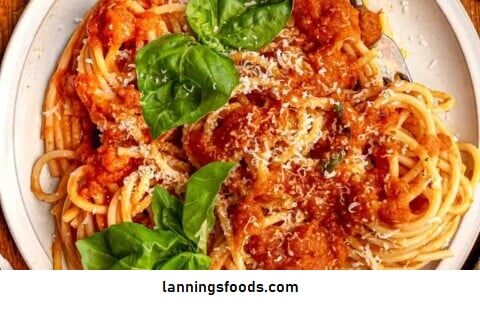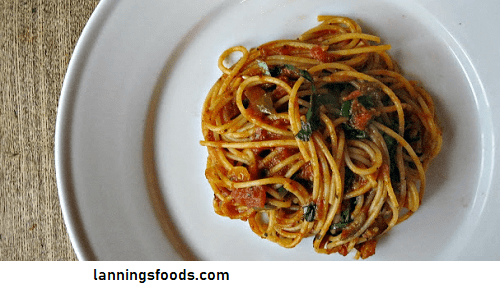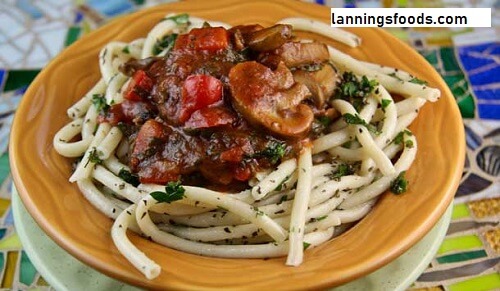Mediterranean Farmhouse Spaghetti Sauce: Culinary Explorations in Tastebuds of Rustic Gastronomy Heritage:
Mediterranean Farmhouse Spaghetti Sauce:
Spaghetti Mediterranean sauce is one of the few staples that can be found spread in numerous cuisines around different parts of the world, relished for its richness and warmth. Italian recipes are almost a religion, but of late there has been an increasing urge to explore regional variations that may bring forth a flavor and ingredient profile that could open new tastes. One such variation is the Mediterranean Farmhouse Spaghetti sauce.
A recipe that combines the simplicity of rustic farmhouse cooking with the vibrant, healthful ingredients characteristic of Mediterranean cuisine. Here in this article, we’ll explore the very essence of Mediterranean Farmhouse Spaghetti Sauce, digging in to lay bare its components how it is prepared, and the culinary goodness behind which sets apart this dish.

The Mediterranean Influence:
Mediterranean Farmhouse Spaghetti Sauce:
The freshness and wholesomeness of Mediterranean cuisine let their recipes boast beautiful intense yet subtle flavors. They transform vegetables, olive oil, and herbs into symbols of healthy living, underlining simplicity and quality in a lifestyle. All this is the embodiment of Mediterranean Farmhouse Spaghetti Sauce, giving depth of flavor that’s nourishing and satisfying.
Key Ingredients:
Mediterranean Farmhouse Spaghetti Sauce:
The judicious selection of its ingredients is the key aspect of Mediterranean Farmhouse Spaghetti Sauce and it helps to add to the complexity of flavour of the sauce. This can be broadly structured into:
- Tomatoes: The backbone of any good spaghetti sauce, tomatoes form a tart base. To give it a Mediterranean touch, you can use ripe Roma or San Marzano tomatoes, with a deeper flavor and lower water content compared to many others.
- Pure olive oil is cooked in Mediterranean cuisine. Extra virgin olive oil adds a fruity richness and silky texture to the sauce but also brings health benefits since it contains monounsaturated fats.
- Garlic: Fresh garlic is used to provide that pungent, aromatic flavor to the sauce. It must be finely chopped or minced so that it will be well dispersed throughout.
- Onions: Onions should not be left out because sweet flavor gives a savory depth, and for a balanced taste use yellow or red onions.
- Herbs: Many herbs comprise the Mediterranean diet. Make use of basil, oregano, and thyme in your sauce. Each herb will add different layers to this dish, but they all bring an aromatic characteristic to enhance food.
- Bell Peppers: Just add a bit of sweetness and nice texture. Use red, yellow, or green. Chop finely, please.
- Capers and Olives: Capers and olives will give you that salty, savory flavor you’re looking for. Actually, as a tangy complement, Kalamata olives specifically pair well with this because of their strong flavor.
- Red Wine (Optional): A dash of red wine can impart some more richness and depth to the sauce. A good, dry red wine will go well with the rest of the ingredients.
- Sugar: A little pinch of sugar will make the tomatoes not too acidic, making them even better with a complementary flavor.
- Salt and Pepper: Of course, this goes without saying, for seasoning, to add flavors from the other components.
- Prep: Sauce Prep Building the Perfect Sauce Making Mediterranean Farmhouse Spaghetti Sauce is so easy; just sit, wait, and pay attention.

Here’s how to make this delicious sauce:
Mediterranean Farmhouse Spaghetti Sauce:
Sauté Aromatics:
Use generous amounts of olive oil in a large skillet or saucepan and heat over medium fire. Add the chopped onions into it and continue cooking until they turn translucent and slightly caramelized. You do this for about 5-7 minutes. Add the minced garlic afterwards and fry it for another minute but see that you are not allowing the garlic to burn.
Cook the Vegetables:
Put the bell peppers you sliced in the pan. Stir them to soften. That should take about 5 minutes. The peppers should be softened but not mushy.
Add Tomatoes:
Add your crushed or chopped tomatoes to the mixture. Let them marinate with the remaining ingredients. If you are using canned tomatoes, you might want to add some of that juice to the sauce for better consistency.
Add Herbs and Seasonings:
Now add the chopped herbs, i.e. basil, oregano, and thyme to the tomato mixture. Mix them well so that the herbs are evenly spread. Season with salt and pepper according to the taste. Add red wine at this point and simmer it over low flame for a few minutes till most of its alcohol content evaporates.
Simmer and Steep:
Turn the heat down a bit so it simmers nicely. Let it sit there, as that is where flavors mix and steep together. You can stir them up now and then and let them simmer for at least 30 minutes. If it’s too thick, you add a little water or vegetable broth.
Add capers and chopped olives:
Stir them in 10 minutes at the end of the sauce preparation. It will add a depth of savory, with a hint of saltiness to complement the sweetness of the tomato and the richness of the olive oil.
Taste and Correct Seasoning:
Return the sauce to taste. If too acidic, a pinch of sugar will correct that.
Serve and Enjoy:
When the sauce has thickened and developed its flavors, it’s ready to go. Toss with your favorite cooked pasta or a base for lasagna or baked pasta.
Culinary Benefits and Versatility:
Mediterranean Farmhouse Spaghetti Sauce:
Mediterranean Farmhouse Spaghetti Sauce is rather tasty besides offering some culinary benefits:
Healthful Ingredients: Olive oil, fresh vegetables, and herbs represent some bases of Mediterranean diets inextricably linked to different health outcomes, such as heart health and longevity.

Versatility: It can be used with many dishes very easily. While it may do well as a pasta sauce, it makes an excellent topping for grilled vegetables or the base for a pizza. It is also a great and flavorful addition to soups and stews.
It can be made in quantity and refrigerated for a week or frozen for three months. The best applications of this sauce are its easy uses, as it can be pre-prepped with meal prep or quick dinners.